Welcome back to the Supporting Actress Smackdown, a summer festival in which we investigate Oscar vintages from years past. This time around it's 1981 in which an estranged daughter, an unhappy socialite, a guilt-ridden Catholic, a political radical, and a scandalous young beauty gather for our viewing pleasure.
1981's Supporting Actress nominations made room for a two-time winner (Jane Fonda, On Golden Pond) with a very personal project, an actor's actor in a star-driven historical epic (Maureen Stapleton, Reds), two sturdy characters in 'issues' pictures of very different kinds (Melinda Dillon, Absence of Malice and Joan Hackett in Only When I Laugh) and a rapidly rising starlet (Elizabeth McGovern, Ragtime) who had made a big film debut the year prior in 1980's Best Picture winner Ordinary People.

Here to talk about these five nominated turns and the movies and Oscars of 1981 are, in alphabetical order: writer/director Eric Blume, actor Donna Lynne Champlin (Crazy Ex Girlfriend), actor Sean Maguire (Once Upon a Time, The Magicians), festival programmer Amir Soltani, and critic Boyd Van Hoeij (The Hollywood Reporter). And, as ever, your host at The Film Experience, Nathaniel R.
Let's begin...
1981
SUPPORTING ACTRESS SMACKDOWN + PODCAST
The companion podcast can be downloaded at the bottom of this article or by visiting the iTunes page.
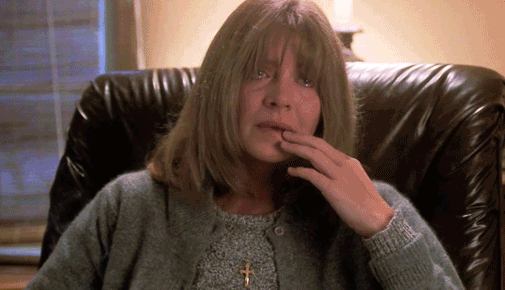
Melinda Dillon as "Teresa" in Absence of Malice
Synopsis: The troubled best friend of a murder suspect considers providing his alibi. She'll expose her own secrets if she does.
Stats: Then 42 yrs old, 7th film, 4th billed. Second and last nomination. 10 minutes of screen time (or 8% of the running time)
Eric Blume: Dillon has only four scenes in the film, but she makes strong choices everywhere she can. Some of those choices inform her overall characterization: it’s rare to see a painfully (perhaps pathologically?) shy person ever in a movie, and you glean this woman has a deeply scarred emotional background. She even avoids cliché choices (she never alludes to wanting anything more than a friendship with Paul Newman’s character). Dillon creates a specific portrait of a boxed-in, cripplingly withdrawn, deeply guilty Catholic woman who is barely hanging on day by day. We just don’t get enough of her. ♥♥♥
Donna Lynne Champlin: Melinda Dillon is great in this but really hard to see sometimes. Like, literally. Yes, her character is shy but the lack of lighting, her baggy clothes, her hair, even the wind is Cousin It-ing her in every scene. Ms. Dillon’s performance has a nice centered stillness and some beautiful, honest moments in a sea of very “busy” actors doing lots of “business”. She stands out, not so much by grabbing your attention- but as an oasis in the midst of attention grabbers. She gives a very humble, layered performance. I believed her. ♥♥♥♥
Sean Maguire: Melinda Dillon is a fine actress and I consider myself a fan. She and the great Paul Newman have a lovely natural chemistry together. But my biggest problem with this performance is her constant smoking to show how distressed and frazzled Teresa is. Unfortunately I suspect Melinda Dillon did not smoke in real life -- it’s obvious and completely took me out of the movie. i’m afraid that should’ve disqualified her from being nominated. ♥
Amir Soltani: Dillon is only present in a few scenes, but one of them is the crucial turning point in the narrative. So while she barely has the chance to give her character depth or complexity, for the film to work on an emotional level, it is key for the audience to respond to Dillon’s heartbreaking confession. She knocks it out of the park. Small gestures are enough to suggest the world of pain she’s been carrying. ♥♥♥
Boyd Van Hoeij: A small role that looks great — and reveals itself as technically very tricky — only after you learn about her fate. It's subtle work that nonetheless makes her final action credible. ♥♥♥♥
Nathaniel R: Absence of Malice doesn't require more from her than a) heavy-headed guilt and b) the suggestion of enduring mental wounds. She certainly sells those two things. In fact, her ability to suggest this level of mental fragility makes us feel guilty for even wishing the following BUT it sure would have taken this performance (and film) up a notch if we had a couple of ghost images in her performance of what Teresa was like before it was alltoomuch for her. Still, that pitiable final scene, played in long shot with her back to the camera, is hard to shake. ♥♥
Reader Write-Ins: "The most memorable. You root for her to be avenged after she is gone. She creates a real person that I feel like I have met." - Greydog (Reader average: ♥♥♥⅓)
Actress earns 20⅓ ❤s
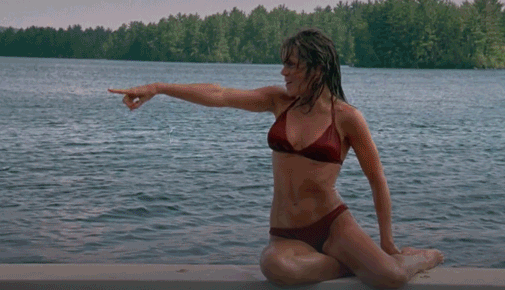
Jane Fonda as "Chelsea Thayer Wayne" in On Golden Pond
Synopsis: The estranged daughter of a crotchety old man, visits for his 80th birthday. The chip on her shoulder comes along for the trip.
Stats: Then 44 yrs old, film, 3rd billed. Her sixth of seven career nominations after two wins (but this is the only "supporting" nomination). 23 minutes of screentime (or 21% of the running time)
Eric Blume: Half of Fonda’s challenge is the role: it’s a terribly-written part, and the script treats her character as stunted when her anger is the most glorious thing about her. And the other half is the context of the main acting trio: the Fonda/Hepburn relationship feels less truly mother/daughter and more younger-great-actress/older-great-actress; and her scenes with daddy Henry have all the real-life double meanings that sometimes take you out of the scene. But she finds wonderful notes. As the family quartet plays Parcheesi, Fonda sits out, clearly fake-reading a magazine as she’s deep in thought and anger at the many years where her father beat her playing game after game, and berated her over something so unimportant. Forty years of shit is in this tiny scene, and Fonda makes you feel the long burn of it all. ♥♥♥
Donna Lynne Champlin: I just…can’t get on the Jane Train here. I’m sorry. I’m such a fan of her other work, but I was a little 🙄 watching this performance. Was it cool that they were actually father and daughter playing father and daughter? Totally. For like, 15 minutes. But then I just felt really bad for her because she was so clearly out-gunned and Katherine Hepburn was SO handsy. Damn, Ethel. Back off. I know Chelsea is supposed to be somewhat unlikable, but her performance felt one-dimensional to me, and I couldn’t get on board. ♥♥
Sean Maguire: Fonda doesn’t really do much wrong in this picture but she also isn't giving the kind of performance one would naturally associate with an Oscar nomination. She’s charming and gorgeous in it but I didn’t really enjoy the movie or love her acting. But for her activism, I adore her. ♥
Amir Soltani: A textbook example of a coattail nomination. A charismatic superstar with a hand in the film’s production, playing the daughter of her real-life father in his coronation film? She was always going to end up with a nomination for a film that garnered ten of them. But as for the quality …well, there’s a scene where she cries and it smells less like cheese than the rest of fromagerie de golden pond around her, so I guess that’s good enough for the Academy? ♥♥
Boyd Van Hoeij: It is her absence in the whole midsection that make her scenes in the final act affecting. Of course she has natural chemistry with Henry Fonda but she's equally believable as the perpetually worrying offspring of Hepburn. Best hair of the five nominees. ♥♥♥
Nathaniel R: "I want to be your friend," sure is a naked line reading. I so admire the meta-vulnerability of this performance opposite her own father. Hell, I even like the stiffness of her performance -- that wouldn't usually be a compliment but I'd argue it's good for this. Now, you can argue that Chelsea isn't much of a character and that the arc Fonda is tasked with is beyond simple but what On Golden Pond lacks in three dimensionality it mostly makes up for in direct arrows to the heart. ♥♥♥
Reader Write-Ins: "The reality of the father/daughter relationship got me over the humps of the script" - Walter M (Reader average: ♥♥♥)
Actress earns 17 ❤s
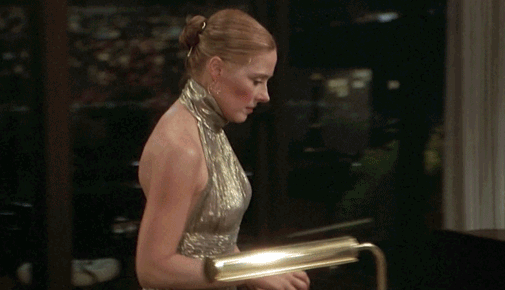
Joan Hackett as "Toby Landau" in Only When I Laugh
Synopsis: A Manhattan socialite tries to support her alcoholic best friend but she's got her own problems as her 40th birthday looms.
Stats: Then 47 yrs old, 11th film, 4th billed. First and only nomination. 22 minutes of screen time (or 18% of the running time).
Eric Blume: Physically, she fills out a variety of mink-accented outfits with aplomb, complete with overly-chic hairstyles and jewelry, all a (yes, clichéd) front for a beating heart underneath. In a long sequence during her fortieth birthday party she shows new layers and scales some substantive heights, though. In her final scenes her voice cracks into gossamer heartbreak as she reveals something deeper and wounded. Hackett commits to the heightened form the writing and role requires (elevated sitcom), but she makes Toby human, and complex, too. And there’s joy in her acting: she has a fizz, and her fizz has a linger. ♥♥♥♥
Donna Lynne Champlin: I liked this performance. It didn’t knock me out, but I liked it. She had a nice arc. She starts out very affected, hiding behind a literal mask of makeup and by the end of the movie she’s bare faced, honest and exposed. It’s a really smart, by-the-numbers performance that makes total sense and is handled with craft and intelligence. Had I not been paying specific attention to it I probably wouldn’t have registered it at all; which is neither good nor bad? Honestly, my biggest take away from this movie was that 1981 orchestrators absolutely loved a good, beat-keeping triangle in their scores. So. That’s where my head was at watching this movie. ♥♥♥
Sean Maguire: This is a pretty skilled performance in both the comedy and drama departments even if the movie is a lackluster early 80s comedy that feels like a PSA crossed with a two hour sitcom. It's a decent performance but for an Oscar nomination? Let's put it this way -- it ain’t Brenda Fricker in My Left Foot. ♥♥
Amir Soltani: The whole film has a really stage-y quality to it (if I was feeling less generous, I’d call it a TV soap). Everything feels incredibly stiff and faked, and Hackett’s performance, though not quite as embarrassing as Mason’s comical drunken slur, is no exception. Nearly everything about the film feels like a first take that should have been discarded in the cutting room. And it’s quite shocking that the only performer with an ounce of emotion in her performance—Kristy McNichol—was the only one of the quartet not nominated by the Academy. ♥
Boyd Van Hoeij: She's the boozy, self-obsessed friend who still cares about you that we all want to have. A 21st century Instagay disguised as an early 1980s woman. Perfection. ♥♥♥♥
Nathaniel R: What a three-dimensional surprise she was within this sitcom. Hackett cuts through the inauthentic quipping with such palpable force that she almost retroactively transforms all the constant "dialogue" from her co-stars and reveals it to as the forced witty posturing of people who are wary of 'getting real'. True, she's as broad as the rest of the cast in a couple of bits early on but by the climax on her Manhattan terrace, she's so full of love, rage, and exhaustion for/with her leading lady that she practically saves the film. ♥♥♥♥
Reader Write-Ins: "Performance within performance; a character designed to put our heroine into clearer focus. Brings a dry wit to her scenes but registers most effectively when given a moment of tenderness. - David U (Reader average: ♥♥♥)
Actress earns 21 ❤s
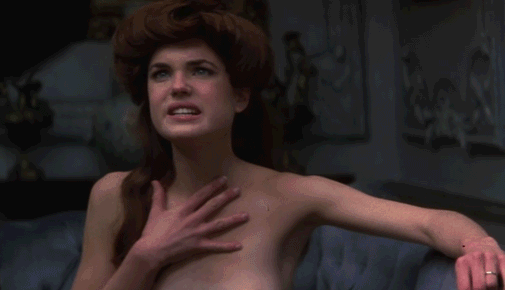
Elizabeth McGovern as "Evelyn Nesbit" in Ragtime
Synopsis: A mercurial beauty who loves to cause a stir is involved in a sexual scandal and a murder trial before joining the nascent film industry.
Stats: Then 20 yrs old, 2nd film, 5th billed (but the principals are in alphabetical order). First and only nomination. 24 minutes of screentime (or 15% of the running time.)
Eric Blume: It’s frustrating watching McGovern trying to make sense of Evelyn Nesbitt as she’s written on the page (the screenplay is no friend to her). She looks like a little girl playing dress-up rather than having any true erotic quality, and you’re never sure why Evelyn is doing or saying anything. She’s best in the beats where she doubles down on Nesbitt’s petulance, but McGovern’s lack of technique prohibits her from having it crystallize into something larger. Much will probably be made about her long topless scene, but it’s truly the moment where she’s most powerful. There are multiple scenes where Evelyn seems alternately dumb, vacant, naïve, or uncaring, but it's here that you realize that Evelyn is always going to be just fine. ♥♥
Donna Lynne Champlin: McGovern has an incredible gift for making unexpected, yet perfect choices. Her Evelyn Nesbit is a woman-child to whom almost everything is a new discovery. Some of her line deliveries seem stilted and odd which could be interpreted as the actress being amateurish... but I disagree. If you imagine Evelyn's actually a 5 year old girl, every choice makes 100% sense. And this is why her topless scene is never gratuitous. She has not one ounce of self-consciousness in that scene (no easy feat). Not because she’s a show girl who shows her tits on the regular, but because 5 year olds just don’t give a shit whether they’re wearing clothes, especially when they’re having a tantrum and trying to get something they want. She strikes an amazing balance between innocent wonder and an hilarious, “over it” adolescence. She blindly marches towards the loudest voice without ever thinking anything through. An exquisite performance. ♥♥♥♥♥
Sean Maguire: She's just fantastic. McGovern seems to have reached the top of her game in Ragtime. It's a beautifully spirited and passionate performance. In my opinion she was very unlucky to not take home the Oscar. ♥♥♥♥
Amir Soltani: Ragtime is sprawling to a fault and undermines moments of powerful drama by stretching the story out and padding it with unnecessary subplots. McGovern is one of the strong suits that one wishes the film would come back to. As Evelyn Nesbit, she’s both a victim of the insanity and greed of the men around her, and a fiery rebel who forges a path for herself, away from the vindictive men who want to take her career away. She’s great at conveying this dichotomy. Unfortunately the film leaves her on the periphery of the story. ♥♥♥♥
Boyd Van Hoeij: She's naive and yet there's something sly and interesting and maybe even intelligent about her, even if you're rarely sure that she's quite aware of it herself. A complex character and a performance that's exciting to watch. ♥♥♥♥
Nathaniel R: It's hard to get a bead on Evelyn who is a bit like the Forrest Gump of this particular historical drama; a good chunk of the events in Ragtime are egged on by or yoked to her very existence. But I'll admit I also thought it was a bit hard to get a bead on McGovern's take on her at first. Is this chorus girl turned society wife turned adulterous floozy turned actress insipid or merely bored; Eventually I decided on the latter since McGovern has Evelyn perk right up whenever scenes devolve into chaos (which is surprisingly often). She really grew on me as the movie went on and she's quite funny despite a lack of 'jokes'. Perhaps I'm undervaluing her? ♥♥♥
Reader Write-Ins: "Deliciously oblivious to the gravity of her actions and the seriousness of her exploitation. The best scene in Ragtime belongs to McGovern who utilizes nudity, and a daft sensibility, to hilarious effect." -John V (Reader average: ♥♥ ⅔)
Actress earns 24⅔ ❤s
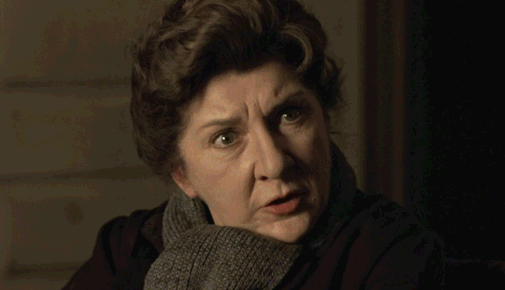
Maureen Stapleton as "Emma Goldman" in Reds
Synopsis: A radical thinker so unnerves the US establishment that she's deported to Russia. In Russia she loses faith in "the revolution."
Stats: Then 56 yrs old, 13th film, seventh billed (but it's alpha order for the principals). Fourth and final nomination. 10 minutes of screentime (or 5% of the running time).
Eric Blume: Stapleton cuts right to the center of the essence of the woman: her anarchy and politics didn’t inform her, they WERE her. You believe that this woman got things done based on Stapleton’s focus and intimidating intelligence. She gives Emma a seen-it-all-before quality where prison is part of the lifestyle, and strategy and duty are centered. She has a remarkable scene with Diane Keaton early in the picture where she stops being the activist and takes a moment to try to know her comrade Reed’s new girlfriend. When Emma asks Louise what she writes, and the reply is a disconnected “everything…and nothing”, the judgment and disapproval burn hard. This is why Emma makes so little time for people, because they disappoint; Stapleton’s Emma will give you a window, but you have to climb into it, not jump out of it. The actress gives Reds intellectual credibility and effortless dignity… it’s a big contribution in a very small package. ♥♥♥♥
Donna Lynne Champlin: There are certain actresses when they appear onscreen or onstage everyone just relaxes because they know everything’s going to be alright. Ms. Stapleton is one of those actresses. This performance is honest and strong and her work is gorgeously clean. There’s not one iota of fat. Her pace is super-fast in general because Goldman was such a quick thinker, but it also pays off when Ms. Stapleton really wants us to pay attention. All she has to do is slow down slightly or simply take a breath and we’re at “pin drop” level. She’s an amazing actress at the top of her game. I’m certainly not mad that she won the Oscar. ♥♥♥♥
Sean Maguire: Maureen Stapleton is always great in anything. Her performance in Reds is no exception but I feel that this was an Oscar given for the three times she didn’t win previously. She’s strong and commanding (as always) and it’s a solid performance but I think the Academy just felt it was time to give her her statue. ♥♥♥
Amir Soltani: Stapleton’s cameo performance isn’t a work of many intricacies, but the Academy often responds to single moments better than complex characterizations; and as far as single moments go, few are as memorable as her final scene with Beatty. In a rare instance of calm amidst revolutionary fervor, she delivers a sobering, bitter reminder of the failures of the communist movement’s ideals to one of its most ardent activists. In a film that uses politics mostly as a background for the central love story, the bluntness of this sequence, and Stapleton’s pivotal role in it, is hard to shake off. ♥♥♥
Boyd Van Hoeij: An earthy presence in a movie full of turmoil yet fiery when necessary. But is she really the best of the bunch? ♥♥♥
Nathaniel R: Her first big scene at a party at a table with her acolytes plus Louise (Diane Keaton) is a mini-masterpiece of acting that's impossible to overpraise. Everything is inspired from the way she projects complete dominion of the conversation (without actually dominating it) to the single-mindedness of her fervor and the laser clarity of her reactions to Louise (who she's just met and wants to listen to -- another woman at the table!) which sadly turns from generous full attention to abrupt dismissal when she decides the younger woman has nothing of interest to say. Later though I was surprised to realize she's barely in the movie (as she'd dominated my memories of it) and her late-film scenes in Russia, though still strong, have less seismic impact. ♥♥♥♥
Reader Write-Ins: "Stapleton finds a huge amount of variation in this small role. She's alive in every scene, and for never a moment was I unsure about her motivation or thoughts about other characters. It's a wonderful departure from the work Stapleton was rewarded for in the past and therefore a rightful winner." - BJT (Reader average: ♥♥♥⅔)
Actress earns 24⅔ ❤s

Maureen Stapleton won the Oscar. But at the Smackdown, Stapleton has to share the honor of that career win with a (then) newbie. Elizabeth McGovern puts up such an unexpectedly feisty fight from the panelists that she manages an exact tie, despite the lowest score among participating readers (you, the final panelist!) Isn't that just like her character Evelyn to disrupt events from proceeding as they were expected to!?!
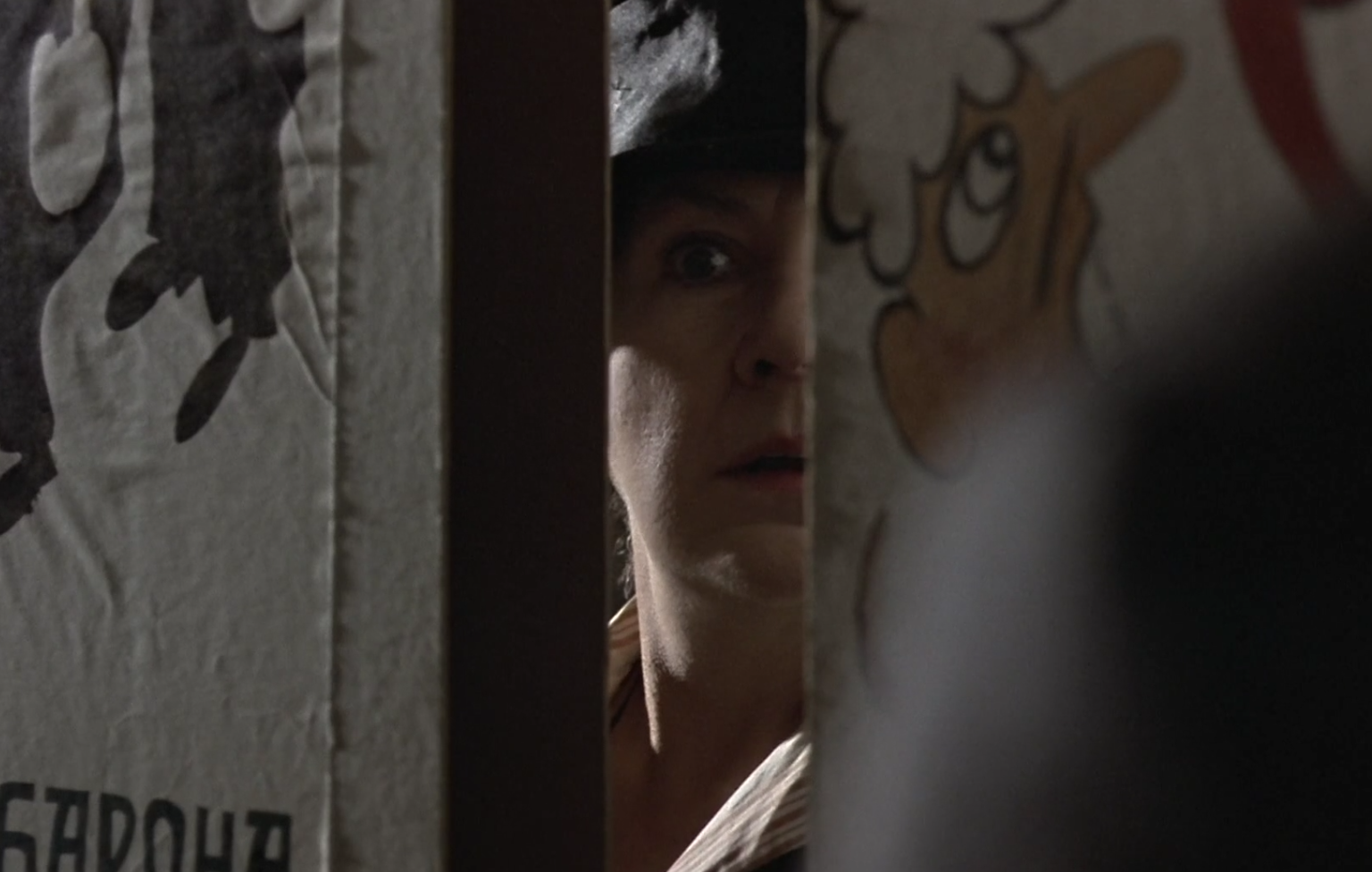
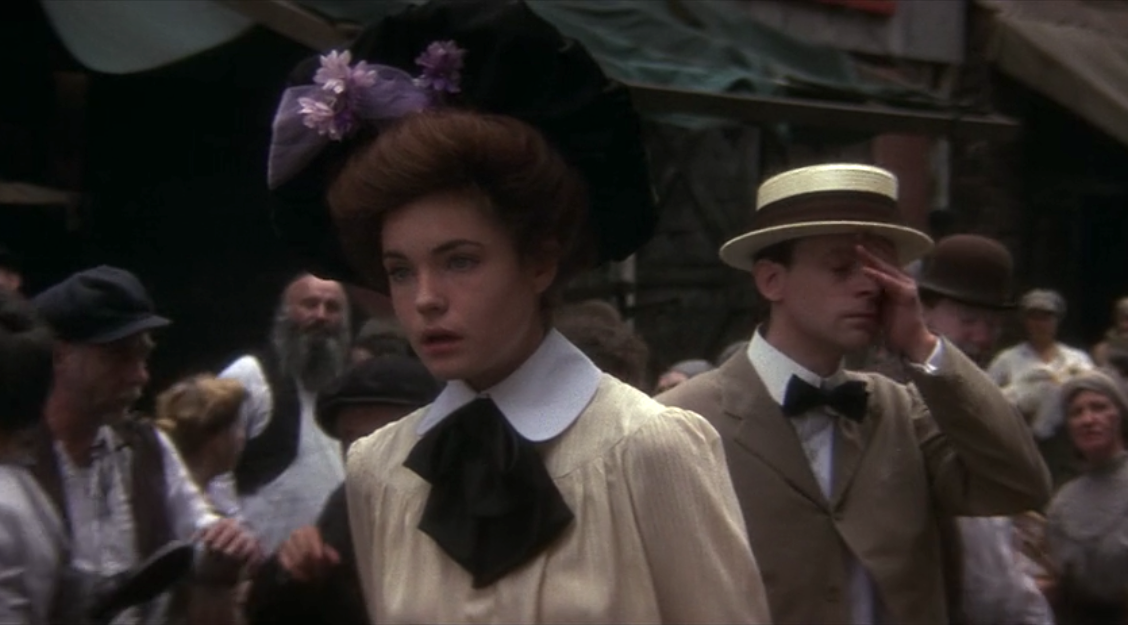 Neither Maureen nor Elizabeth saw this coming!
Neither Maureen nor Elizabeth saw this coming!
THE PODCAST CONVERSATION
Download and listen to the companion podcast right here at the bottom of the post, or on iTunes for a more in-depth discussion with our panelists about these five movies and the women who co-starred in them.
NEXT UP: The 1947 Oscar race will be discussed on May 28th. Watch the Best Picture winner Gentleman's Agreement, Hitchcock's The Paradine Case, acclaimed noir Crossfire, and the comedy The Egg and I before then to maximize your reading and listening pleasure. [All Previous Smackdowns]